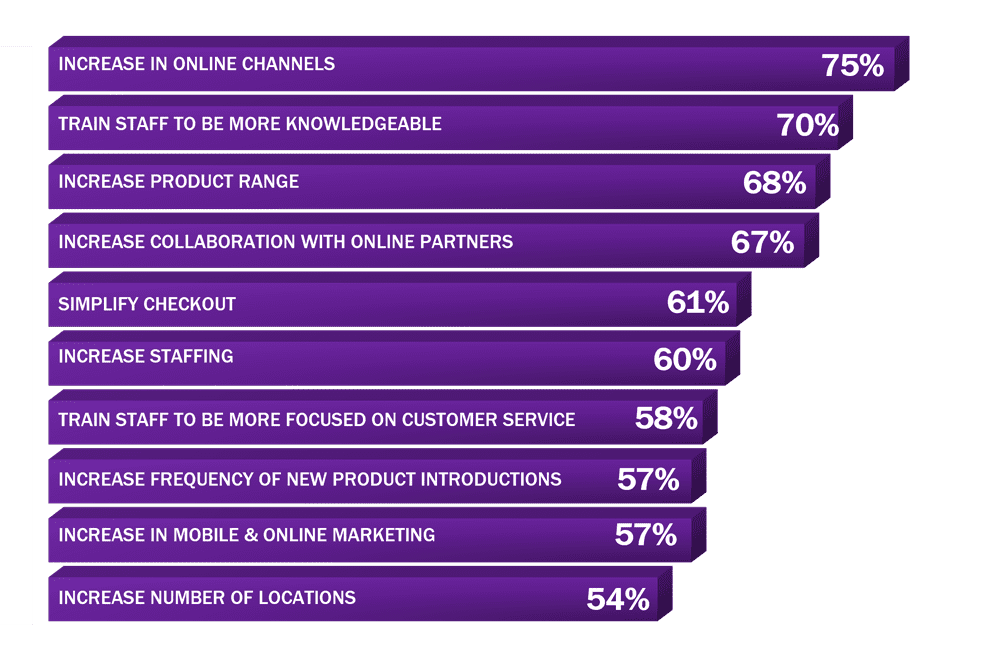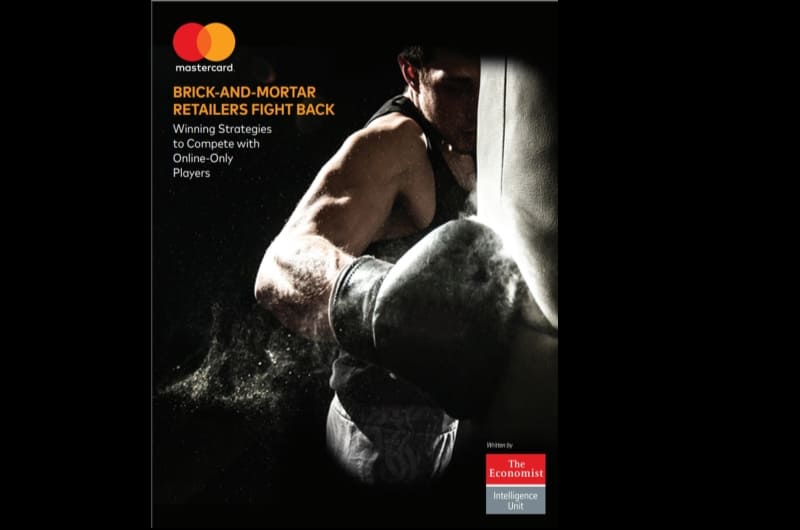Growing competition from lumbering online giants with budgets equal to the contents of Fort Knox is forcing traditional retailers to review their marketing and selling strategies.
Based on a global survey of 256 retail executives, a report called “Brick-and-Mortar Retailers Fight Back” written by The Economist Intelligence Unit and sponsored by Mastercard, reveals the most common methods retailers are using to respond to this pressure.
Here are the results:

Your People Make the Difference
Customer experience is seen as one of the strongest competitive advantages of online only retailers, according to 27% of the survey respondents.
This makes the instore experience provided by traditional retailers their most valuable opportunity to tempt customers back.
Most retailers know it, too. The survey shows that 70% of them have coached their staff more intensively on product knowledge, and more than half have introduced improved customer service training.
As products and service are at the core of any business – especially in retail – let’s look at the types of upskilling that will have a positive impact in ways that online-only stores can’t match.
Product Knowledge: You Can Never Have Too Much
It’s obvious that staff should be well-versed in the features of the products they sell. But sadly, this is often not the case. The problem is most acute with part-time and temporary staff, but even full-timers frequently lack this essential skill.
It’s not enough to grasp the broad product specifications, like sizes, colors, and prices, and so on. Some products have unique selling points and emphasizing these is the most effective way to close a sale.

Understanding product categories is useful too so that customers can be guided more efficiently to the appropriate merchandise. Finding products online is usually a slick, high speed operation and, unless customers are in browsing mode, it should be just as seamless in a regular store.
Staff should be provided with regular updates on new products and industry trends so they can anticipate the needs of your customers. Keeping them informed is simple: hold regular update meetings or circulate bulletins, emails, texts or videos.
Largely through their online browsing activities, and by following forums and social media posts, most of your customers have already narrowed down their product options.
Your staff should be confident enough in their product knowledge to make their sales pitch convincing, especially if they’re trying to switch a customer away from their pre-determined choice. They should also be aware of which products are subject to discounts or are featured in special promotions.
Brief your staff on competitor awareness. Make sure they know what your online and brick-and-mortar competitors are doing to generate sales, and give them the tools to compete.
Exceed Your Customers’ Expectations, Or Somebody Else Will
No doubt you know which of your staff members would score well on an IQ test. But how are their EQ skills, those that relate to empathy and understanding?
Without them, they’ll struggle to master the verbal and non-verbal communication necessary to help you build a satisfied and committed customer base. Explain to them that, when dealing with customers, listening is more important than talking.
Paying close attention to what the customer says will reveal their real needs as opposed to what a salesperson thinks they might be. We have only one mouth but two ears for a good reason!

Problem solving and conflict resolution attract major criticisms from online shoppers and this is another advantage that traditional retailers should exploit.
Teaching by example is obviously beneficial. Canny store owners and managers will supplement this with role playing exercises until each employee is confident and sure-footed enough to turn every problem into a golden opportunity.
Maximize the Value of Every Transaction
Online stores do this brilliantly with multiple prompts for buyers to ‘add to their baskets’ and those annoying little pop-ups that claim ‘customers who bought item this also bought…’
As clever as the algorithms are that generate those responses, they lack the persuasive force of a salesperson who knows their merchandise well and has customer satisfaction as their primary goal.

Selling should never be viewed as some kind of conflict between the seller and the customer. One of the techniques that delivers astounding results is to re-frame the process from one where you’re persuading the customer to buy into one where you’re helping them to make the right choice.
It’s a subtle shift, but it alters the dynamic to a point where the customer is confident that the advice you’re giving is in their best interests and not necessarily only to your advantage.
This is most important when upselling and cross selling. A customer who is relaxed and knows you’re on their side will be much more open to product demonstrations, and will listen more readily to suggestions that will increase the value of the transaction.
The subject of sales closure comes up frequently. Some successful salespeople swear by specific scripts to bring the pitch to a conclusion, others are not convinced.
It’s probably best left to the salesperson’s individual preference. Treating each customer as an individual will, however, result in a natural closing moment.

Your People Will Only Make the Difference If…
Various management studies have revealed that employees are subject to a variety of workplace environment issues that affect their performance. The most important of these are called motivators, the factors that inspire hard work, professionalism, and loyalty:
- A sense of achievement
- Recognition by management and peers
- Responsibility
- Interesting work
- Advancement opportunities
- Growth
In retail, staff training has always played an important role in the long-term success of a business. Unfortunately, above average staff turnover continues to be challenging and the fierce competition from online stores squeezes business owners still further.
However, adopting a range of strategies – including the acquisition and training of highly motivated people – will help to improve customer experience and that is the most powerful weapon in the traditional retailer’s armory.






